Key finding
Food companies need to step up for SDG decade of action

To have a food system that is fit for present and future generations, food companies have a responsibility to address the environmental, nutritional, and social impacts of their operations and value chains. The sector is a leading contributor to climate change, land degradation and biodiversity loss, risks which have the potential to negatively affect the livelihoods of 500 million smallholder farmers, including some of the world’s most vulnerable people. Additionally, more than one-third of the world’s population cannot afford a healthy diet. The number of people going hungry has risen since the start of the century, and has further increased as a result of the COVID-19 pandemic. Whilst a handful of companies are demonstrating that they are taking necessary steps to implement a sustainable agenda across their business practices, the sector as a whole needs to substantially improve their actions and impact.
Leading companies from nearly all segments of the value chain
Of the 350 companies in scope, only 11 scored over 50/100 in their assessment. Although there is clearly room for improvement by all, interestingly, one company from five of the six-value chain segments was represented across the top performers. The only segment that did not score over 50/100 are the restaurants & food service companies. This demonstrates that leadership and positive change can and must come from every part of the value chain, supporting the WBA’s guiding principle that a company of a certain size and influence can and must contribute holistically across the food systems transformation agenda.
Most companies are operating outside the spotlight
Unilever, Nestlé and Danone, well-known brands, top the overall ranking. Beyond the top performers, scores decrease rapidly. Most strikingly, 229 of all companies assessed are performing below 25/100. However, most of the targets and commitments that companies have set need to be realised at farm level or in the supermarkets and restaurants. If conditions are to improve for the millions who depend on agriculture for their livelihood and the most vulnerable families that cannot afford a healthy diet, we need all companies across the value chain to take action and recognise the role they play in the larger system.
From the 229 companies that score below 25/100 on the benchmark, 78 companies score below 10/100 and an additional 32 companies score 0/100. These companies choose to disclose little or no information and do not publicly acknowledge the impact they have on the environment, their workers and supply chain partners and the nutritional intake of people who eat their food. We need these companies to come to the table, take part in the conversation and share the risks and opportunities they face, so that ultimately they can achieve meaningful impact in the system in which they operate.
Accountability is key
The 2021 UN Food Systems Summit is a pinnacle moment to address the interconnectedness of food systems with global challenges such as hunger, climate change and poverty. In the lead up to the event, multistakeholder actors have come together to commit to deliver on the 2030 Agenda. In parallel, WBA has been developing this systems-wide benchmark serving as the accountability mechanism for the private sector. We intend to publish a new iteration of the Food and Agriculture Benchmark every two years, tracking performance until 2030.
With less than a decade left it is imperative to act now. Companies from across the sector must become successful drivers of change and demonstrate strong, fair and innovative leadership. We look forward to working on this together with companies and together with the members of our Alliance.
